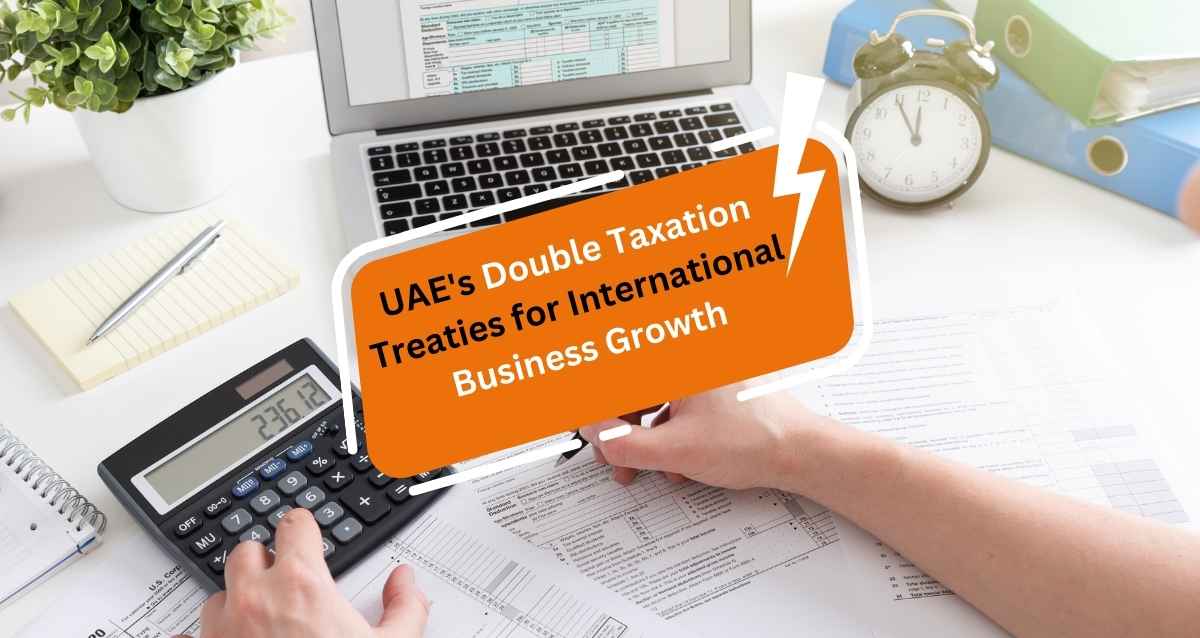Unlock Growth with UAE's Double Taxation Treaties
Businesses looking to expand to the global market can consider The United Arab Emirates (UAE) as a global economic hub. This is because of the favourable environment developed by the UAE government that allows businesses to set up their international footprints. One such appealing UAE achievement is signing the DTAA (Double Taxation Avoidance Agreement) with many countries, which reduced tax burdens and improved cross-border trade and investment.
In this blog, we will be exploring the significance of DTAAs in maximizing the benefits for businesses based in UAE and also about their functions and strategies for promoting international development.
What Are Double Taxation Treaties?
Double taxation treaties are legal agreements made between two countries to ensure that businesses or individuals are not taxed twice for the same income. These legal agreements are called DTAA (Double Taxation Avoidance Agreement). DTAA gives a detailed idea of how the income should be taxed by these agreement-signed countries which includes the taxing rights and mechanism for tax relief.
The benefits of DTAA for UAE-based businesses are as follows:-
-
Reduces withholding taxes
-
Eliminate barriers to cross-border investment
-
Encourage international trade
The UAE’s Extensive DTAA Network
There are around 142 DTAAs signed by UAE with different countries around the globe, major economies among them are India, China, The UK, and The US. Various types of income are covered in these treaties such as:-
-
Dividends.
-
Interest.
-
Royalties.
-
Business profits.
UAE has a forward-thinking approach towards international tax cooperation which resulted and strengthened its reputation as an international business hub for international trade and investment growth.
Key Benefits of DTAAs for UAE-Based Businesses
-
Reduced Withholding Taxes
The payments such as dividends, royalties, and interest paid between the countries who signed DTAAs the withholding tax will be less. For example as per the DTAA between two countries UAE – INDIA, a company based in UAE receiving dividends from a subsidiary in another country India can benefit from reduced withholding tax. -
Elimination of Double Taxation
The major benefit of DTAA is the elimination of double taxation which means the same income is not taxed twice in different countries also allows credit for taxes paid in foreign countries. -
Certainty in Tax Treatment
The DTAA also provide clarity on how income should be taxed which helps to reduce the risk of disputes with foreign tax authorities. -
Enhanced Global Competitiveness
In the global market, UAE companies are more competitive due to the lower tax liabilities. -
Encouragement for Foreign Investment
DTAA always encourages foreign entities to invest in UAE-based businesses to improve economic growth by minimizing tax barriers.

How DTAAs Work in Practice
There are specific criteria and procedures that businesses must meet to avail of the benefits from DTAAs.
-
Determining Tax Residency: The businesses should obtain a tax residency certificate from UAE to showcase their tax residency as UAE.
-
Documenting Eligibility: Documentations like agreements and invoices, is mandatory to claim the treaty benefits.
-
Understanding Treaty Provisions: Understanding the treaty is very important because each treaty is different in terms of reduced tax rates or exemptions and that must be interpreted properly.
Case Study: Utilizing a DTAA for Reduced Tax Burden
✅ Scenario:
A Dubai-based technology company licenses its software to a partner in Germany and receives royalties for the same. Under Germany’s standard tax rules, royalties paid to a foreign company are subject to a 15% withholding tax.
✅ Solution:
UAE Company can benefit from the Double Taxation Avoidance Agreement signed between UAE and Germany. Up on submission of the Tax Residency Certificate of the UAE Company, the German supplier can deduct a 5% withholding tax. This 5% withholding tax deducted can be adjusted against the Corporate Tax liability of the UAE Company as a foreign tax credit.
✅ Outcome:
The Company saves 10% on withholding taxes, which can improve the cash flow of the company, and profitability which enable the opportunity for reinvestment.
The UAE Federal Tax Authority has issued a vital document for claiming the benefits of DTAA. This document is called a Tax Residency Certificate (TRC).
The Role of Tax Residency Certificates (TRCs)
✔️ Steps to Obtain a TRC:
-
Submit the application in the federal tax authority portal.
-
Supporting documents like trade licenses, bank statements, lease agreements and financial statements need to be provided.
-
Pay the applicable fees.
TRC plays a crucial role in providing the benefits of withholding tax rates or other treaty benefits.
✔️ Challenges in Leveraging DTAAs
Keeping significant benefits apart, DTAA has certain challenges, including:
-
Complex Documentation Requirements: Need to ensure all paperwork is accurate and complete to meet treaty obligations.
-
Interpretation of Treaty Provisions: Misunderstanding the terms of a treaty can lead to disputes or missed opportunities.
-
Compliance with Local and International Laws: Balancing UAE tax regulations with the laws of other jurisdictions.
In order to overcome these challenges the professional tax consultant comes into the picture, consulting and getting pieces of advice from the responsible person is always advisable.
Maximizing DTAA Benefits: Key Strategies
-
Understand Treaty Provisions Thoroughly
The first step is to study properly and identify the benefits and tax reliefs which can be availed as per the Double Taxation Avoidance Agreement. -
Plan Transactions Strategically
All cross-border transactions can be structured in a way to get full treaty benefits by way of reduced withholding tax rates. -
Maintain Accurate Records
Any transactions related to the cross-border (receipt or payments) must be kept safely in the specific format to prove the claim of treaty benefits. -
Work with Tax Experts
Work with tax experts who are specialized in international taxation and have in-depth knowledge of the double taxation treaty in order to make sure that your business is compliant. -
Stay Updated on Treaty Changes
Tax Treaties can be modified, expired, cancelled etc. The businesses must be up to date with the changes in the agreements happening between the countries.

Future Prospects: UAE’s Role in Global Taxation
The UAE’s role in global taxation enhances its attractiveness as a global business hub by expanding its DTAA network and commitment to achieve more networks.
Businesses in UAE can explore and benefit;
-
More treaties with emerging markets.
-
Greater emphasis on compliance with international transparency requirements, such as OECD’s BEPS framework.
-
Enhanced support for businesses through streamlined processes for claiming treaty benefits.
Conclusion
DTAA is a very critical component of the international tax framework, these treaties should be leveraged effectively because it is considered as tools to reduce tax burdens, improve profitability and also it help to penetrate to global market and also can navigate the complexities of cross-border taxation.
We, Flying Colour Tax Consultant LLC, assist clients not only to get the benefits of Double Taxation Treaties but also to make sure that our clients are compliant in cross-border transactions. Reach out to us to discuss your business transactions, especially cross-border transactions to find a solution to the pain of Double Taxation.
To learn more about Leveraging UAE's Double Taxation Treaties for International Business Growth, book a free consultation with one of the Flyingcolour team advisors.
Disclaimer: The information provided in this blog is based on our understanding of current tax laws and regulations. It is intended for general informational purposes only and does not constitute professional tax advice, consultation, or representation. The author and publisher are not responsible for any errors or omissions, or for any actions taken based on the information contained in this blog.

